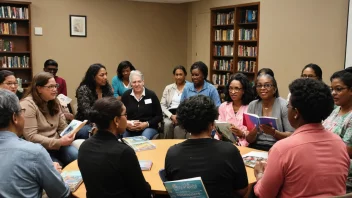Introduction
Starting a book club can be an enriching experience for both avid readers and casual book enthusiasts. In this article, you will learn how to establish a successful book club focused on fiction, create engaging discussions, and foster a community of literature lovers. By following the steps outlined below, you’ll be well on your way to creating an enjoyable and meaningful reading experience for all members.
Step 1: Define Your Book Club’s Purpose
The first step to starting a book club is to clearly define its purpose. Consider the following:
- What genre or theme will your book club focus on? For this article, we’ll concentrate on fiction, but you may also want to consider sub-genres like literary fiction, science fiction, or romance.
- What do you want members to gain from the experience? Is it simply reading more books, discussing themes, or forming friendships?
- Will your club meet in-person, virtually, or a mix of both? Decide what works best for your group.
Step 2: Gather Members
Once you've defined the purpose, it’s time to gather participants. Here are some tips:
- Start with people you know: Friends, family, or colleagues can be great initial members.
- Utilize social media: Post on platforms like Facebook or Instagram to reach out to potential members.
- Consider community boards: Libraries, bookstores, and community centers often have bulletin boards where you can post flyers.
Step 3: Choose the Right Books
Choosing the right books is crucial for keeping members engaged. Here’s how to do it:
- Survey members: Once you have a group, ask for book suggestions. This encourages participation.
- Mix classic and contemporary: Balance well-known classics with new releases to cater to diverse tastes.
- Consider diversity: Aim for a range of voices and perspectives to enrich discussions.
Step 4: Establish a Meeting Schedule
Consistency is key for book clubs. Here’s how to set a schedule:
- Decide on frequency: Monthly meetings are common, but bi-weekly can also work if members are eager.
- Choose a day and time: Consider everyone’s availability; weekends or weekday evenings often work best.
- Set a duration: Meetings should typically last between 1 to 2 hours.
Step 5: Create a Discussion Framework
To facilitate engaging discussions, create a framework. Here’s how:
- Prepare questions: Develop open-ended questions about the book’s themes, characters, and plot twists.
- Assign roles: Designate a facilitator for each meeting to guide the discussion and ensure everyone participates.
- Encourage respect: Remind members to respect differing opinions and keep discussions constructive.
Step 6: Incorporate Fun Activities
Make your book club more than just reading and discussing. Here are some activities to consider:
- Host themed meetings: If reading a mystery novel, encourage everyone to dress in detective attire.
- Invite guest speakers: Reach out to local authors or professors for guest appearances.
- Organize field trips: Plan visits to book-related locations such as author readings or literary festivals.
Step 7: Gather Feedback
To ensure your book club remains enjoyable and relevant, regularly gather feedback. Follow these steps:
- Conduct surveys: After a few meetings, send out a simple survey asking what members like or want to change.
- Hold feedback sessions: Dedicate time during one meeting to openly discuss what’s working and what isn’t.
- Be adaptable: Be willing to make changes based on feedback to improve the experience.
Summary
Starting a book club focused on fiction is a rewarding endeavor that fosters a love for literature and community. By defining your club’s purpose, gathering members, choosing the right books, establishing a meeting schedule, creating a discussion framework, incorporating fun activities, and gathering feedback, you can create a thriving space for book lovers. Remember, the ultimate goal is to enjoy reading and connecting with others who share your passion.
Final Advice: Keep the atmosphere light and fun! Book clubs are about enjoyment, so focus on building relationships through literature.






